Tim Donley is a games industry vet with over 20 years in the biz. His titles range from Fallout to Star Trek to Dungeons & Dragons, and most recently has been working on his own indie title, Boss 101. We had a great talk about Planescape: Torment and the conversation ran over into an energized (and long) discussion of Kickstarter. Below is the first of two parts:

Tim Donley, everyone!
So let’s talk a little bit about Kickstarter and crowdfunding– now, the last time we spoke it was primarily about Planescape: Torment but we ended up chatting about Fallout, and World of Warcraft, and a then a few new crowdfunded projects like Tides of Numenera.
Tim: Haha all that stuff! Of course, yeah that was a fun time! I remember seeing that Torment: Tides of Numenera had come out since we spoke last, and at the same time Beamdog in Canada re-released Planescape: Torment and I gotta say – I may have mentioned it before but Tides of Numenera was interesting to me. I was originally in talks to potentially work with InExile on that game and I just… I didn’t get a great vibe from it at the time and that was only because I have such fond memories of Torment, so I think for me it was that I’d be going back, but not going back to the actual setting. That was a weird thing for me. The way they were handling it sounded very bizarre, in that it was everything but Planescape. It would be like:
“We’re gonna make a sequel to Star Wars!”
“Yeah, yeah! Will it have lightsabres?!”
“No, no, but we have these wooden swords instead!”
“Oh – oh OK, well that’s cool I guess. But do we have jedis and force powers?!”
“No, we don’t have those either. We can’t use those because they’re copyrighted by someone else, so we actually have to use old nuns and stuff.”
“Oh, OK… so no lightsabres, but you got wooden swords, and nuns… but what about Death Stars? Can we have Death Stars and stuff like that?”
“Noooo, no Death Stars but we do have giant armored vans, and you kinda race around in the desert!”
“Man, that sounds like Mad Max with nuns or something.”
“Yeah that’s kinda what it’s like… but don’t call it Mad Max! We’re gonna call it Star Wars.”
“Oh – well isn’t that going to be confusing? Aren’t people going to be expecting TIE Fighters and –“
“Oh we can’t do TIE Fighters. Can’t use the name TIE Fighter, so we have this thing called the Alphabet Fighter and that’s gonna be in there. It’s gonna be a car, actually, with a bazooka on the front!”
“Alright, that’s kinda cool I guess… is anyone gonna know what the hell this is?”
“Oh don’t worry about that! For now we’re just gonna have you do a nostalgia video so you can remind people how awesome the original was…”
And so when Numenera came out, it did what I kind of expected, which is it seemed like it was a little ponderous. It was a little leaning on the things in Planescape: Torment that people said they liked… but, it’s almost like a kid’s party, as if you asked a kid, “what do you want for dinner tonight?” and they say, “all ice cream! I want all ice cream, and I want 500 cakes,” and you say, “but if we give you that, you’re gonna be sick” and they’re like, “noooo, that’s what I want!”. And with Numenera, I remember them talking about having, say, 18 novels’ worth of writing in it and I thought that sounded cool, but is that what people really want? And they would tell me how that’s what people talked about – how it had the most words of any game ever up to the time, and I just thought it was strange. I mean, on the whole it did OK. I don’t think it tore up the whole RPG market, though.
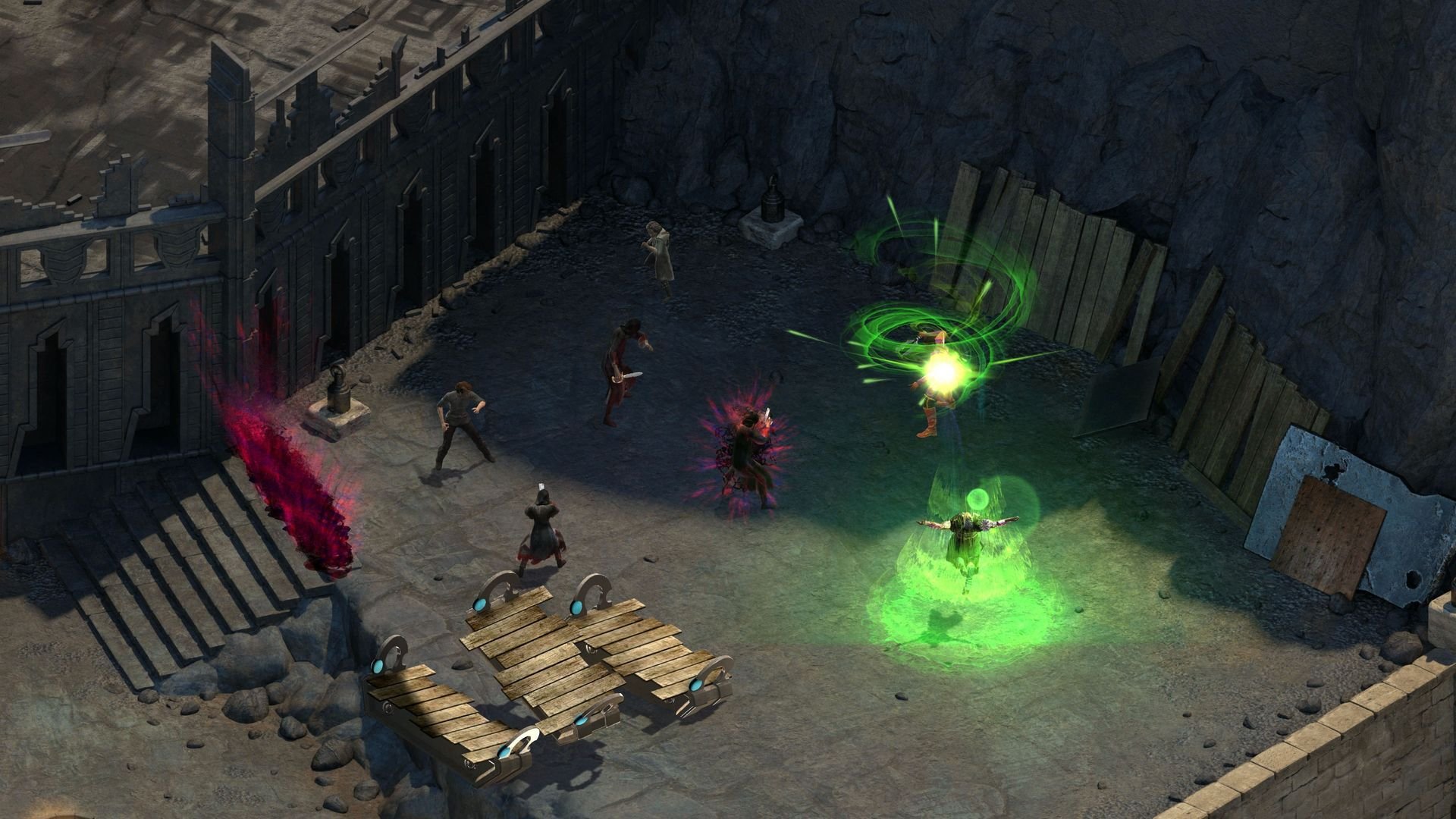
Torment: Tides of Numenera. View full size.
I think it made a lot of people happy – people that wanted just that. I haven’t played it yet, and all I’ve seen is marketing and reviews, but I guess people wanted more of the same. And I think it was similar to the appeal of Pillars of Eternity. Did you play that?
Tim: No, I haven’t played any recent Obsidian games in the last 5 or 6 years, including Pillars. Now I know there’s another one. I mean, there’s Pillars 2 but there’s another one they did.
Tyranny?
Tim: Yeah Tyranny, that’s the one.
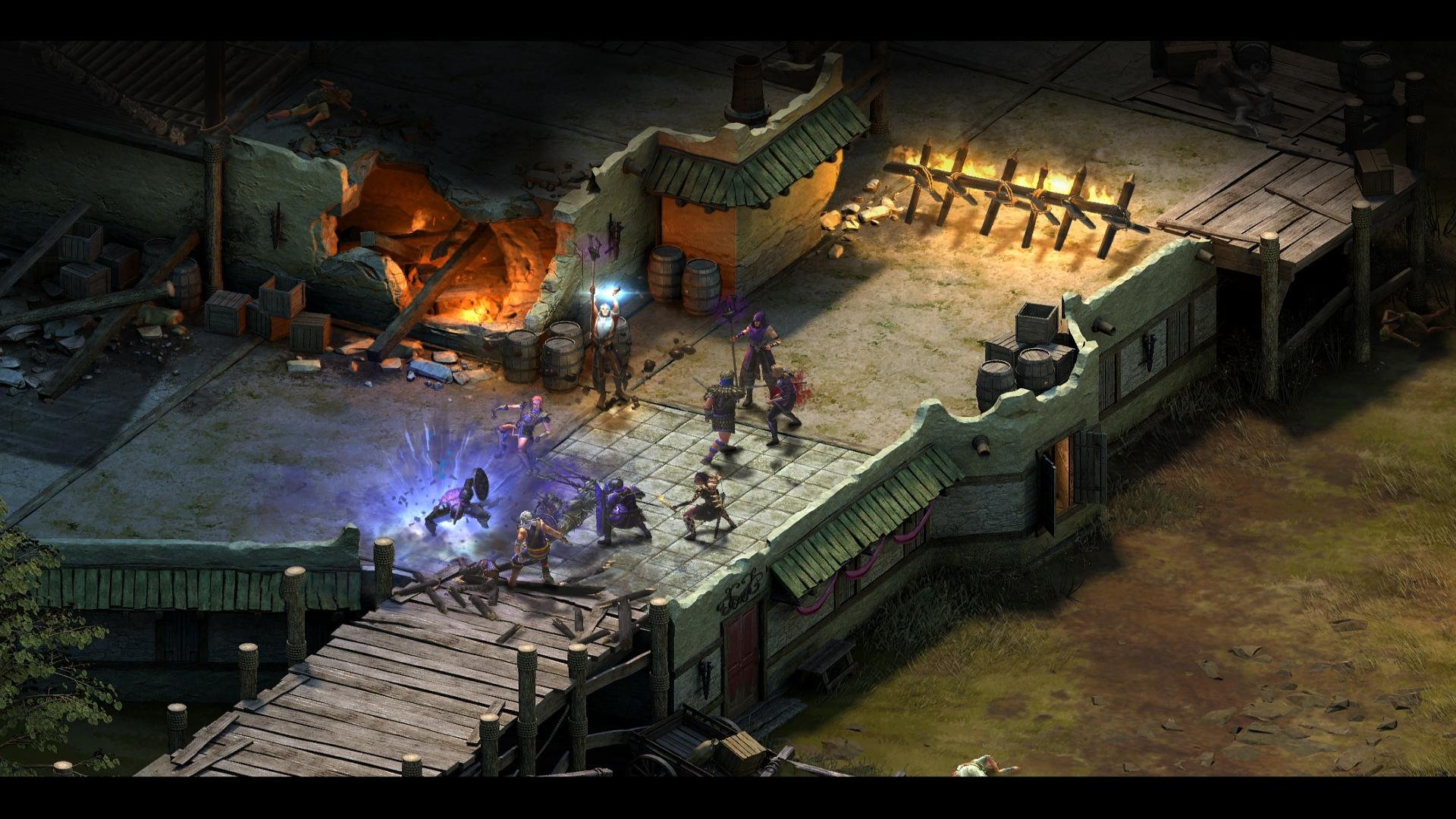
Tyranny. View full size.
So, I was a day one backer of Pillars because Baldur’s Gate 2 is probably my favorite game of all time, and Pillars was… not Baldur’s Gate 2, and I wanted it to be Baldur’s Gate 2. So I played Baldur’s Gate 2 Enhanced Edition about a month ago, and even that wasn’t Baldur’s Gate 2 anymore, you know? Do you think that there’s a dream for which we quickly open our wallets or our PayPal accounts, but that nothing will actually recapture?
Tim: Yeah, and the thing that they’re doing a lot of times is… look, I know the guys who made Baldur’s Gate 1 and 2 and of course those are BioWare guys, and I know the guys who made the original Planescape: Torment and they weren’t working on Numenera. Mostly, the guys who are working on it were secondary teams on Planescape: Torment, or were fans of it. A lot of those games like Baldur’s Gate and Torment were products of their time. It worked really, really well at the time but since then, honestly there’s been improvements, there have been games that have done storytelling in interesting ways… I mean, part of the thing is that those games told a story in a way that was unique to the other games of the time, but now so many other games tell stories in such great and interesting ways that it’s hard to say, “we’re gonna have a game with a lot of text” and that’s gonna be the new thing. Because it’s not – that was already done 17 years ago now, so it’s hard to come back and say, “well you should back this game because we’ve got clickety-click companions with bad AI you should just let join your party, and we got fireball spells that may or may not hit the right guy…”.
Well that’s great, but it was great then because everybody understood that that was what we were dealing with. It’s almost like people who buy hotrod cars… like, it’s cool and it was a great car in its time, and it was the fastest car around and it’s neat to drive as sort of an interesting nostalgia piece, but nobody would argue that that’s the best car you could make right now. And I think a lot of those guys are making that debate – like this is gonna be a spectacular RPG on the level of Skyrim or Dragon Age. You’re really reaching high if you’re doing that.
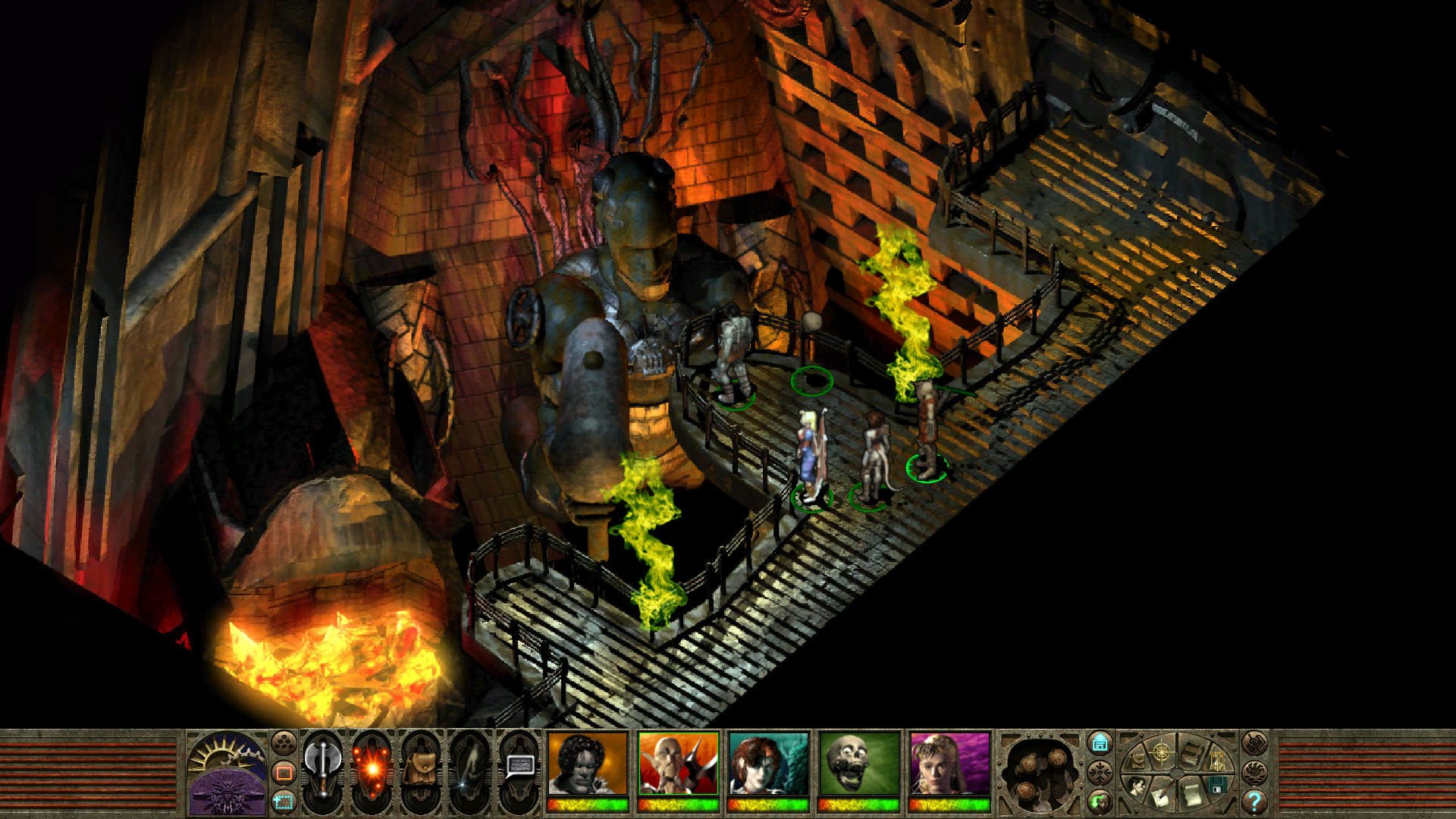
Planescape: Torment. View full size.
I mean, if you were to release Planescape: Torment today as is, I don’t think you could say it’s gonna sell 5 million copies – it didn’t sell 5 million copies back then! It was a few hundred thousand! It’s one of those games where it has influenced games but I don’t recall it tearing up the market. I mean, I wish it had – everybody wished it had! If it had, I’d be sitting with gold walls behind me now! (laughs) I’d be talking from my palace in Beverly Hills, and the Hollywood sign would be visible through a window there!
And you’d own it!
Tim: Hahaha, yeah and it would say ‘Timmywood’ or something! So yeah, Planescape was what it was, and they all look back on these games as though there are hundreds of millions of people just dying to play it, and I don’t think there are. Not to say those games couldn’t sell that, but not in their forms. There were games selling millions. Blizzard was making games like the WarCraft series, the Diablo series, and there were games on console that sold millions even then, but the PC RPG market at the time was never really a million seller. Now you get Skyrim, and it does sell millions. You get Fallout, and it does sell millions – but that game has been catered to a new market.
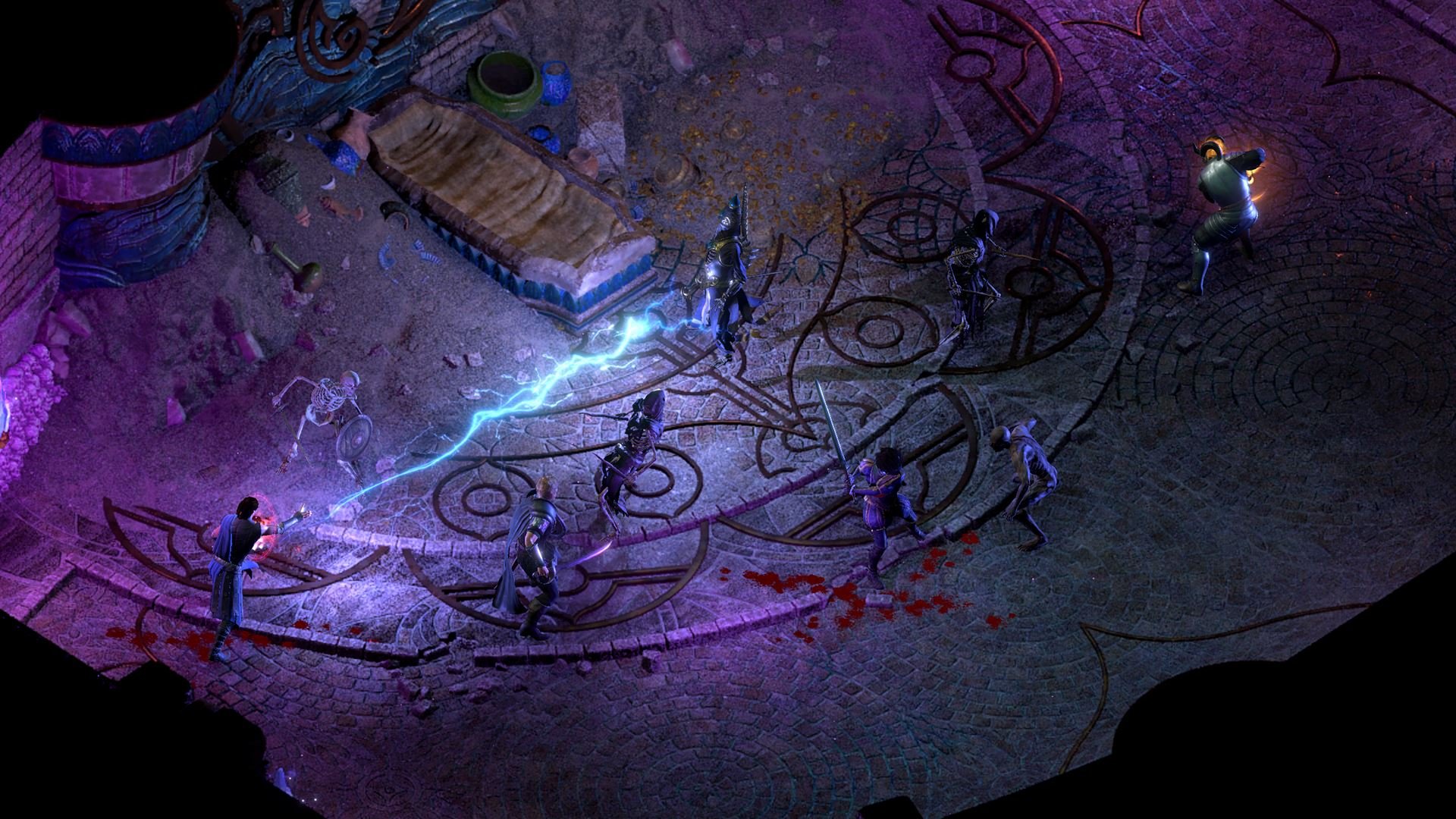
Pillars of Eternity 2. View full size.
Now, I’m really keen to see what happens to Pillars 2… it doesn’t interest me personally very much but I think they found a good niche to do something and they’re good at it, and hey man they’re gonna keep doing it and that’s awesome. Good on them.
Do you know about Pathfinder: Kingmaker? That’s the new one that Chris Avellone is involved with – by OwlCat Games. It looks great, it’s contemporary, it’s Pillars of Eternity/Baldur’s Gate high fantasy, it’s an isometric RPG, it’s got different companions… it’s the list of features that you love about the old RPGs and there’s enough of an audience… Maybe you could just talk about that – this is a nostalgia ride, these games wouldn’t be picked up by many publishers… any publishers, really… but these fans, are they buying the new game, or are they buying the promise of what they remember from their experience 15 years ago? What do you think of Kickstarter as the means for this niche staying alive?
Tim: I think now that we’re talking with the ability to look back on Kickstarter and games that have been funded on it, and what I love about it (and this sets the stage for an answer to what you just said), is that I think it’s pretty easy to tell people now what game development is like. If you look at a Kickstarter, and especially if you’re a backer, you’re going to understand what a producer or a developer, even a publisher in this case, has to go through in that you have to watch the game evolve… it starts with an idea, and there’s a lot of iteration, and rarely does a game just come fully formed and then stay exactly in that form all the way through.
In other words, from the day I pitch it to the day it ends, it’s rarely exactly the same game and it’s everything that was said and it’s as exciting as you’d hoped… well games go through a lot of iterations and Kickstarters in particular, they’re falling in that category with the Metroidvania nostalgia-wave, where everyone’s like, “remember way back when we all had one jump and one life and you could do this or that” and we go, “yeah I remember back then, when milk was a nickel, and the presidents were great, and everybody had a car” – but actually, it wasn’t that good… it just wasn’t. We hated it – I hated it as a kid, and I remember playing Strider and Ghouls & Ghosts… I had Ghouls & Ghosts on the Sega Genesis. I remember buying it. It was a $60 game, super expensive, and I could only afford one game at the time and I played the hell out of it, and it was a one-hit death (well two if you had armour) and you had to memorize everything, and it was full of cheap shots.
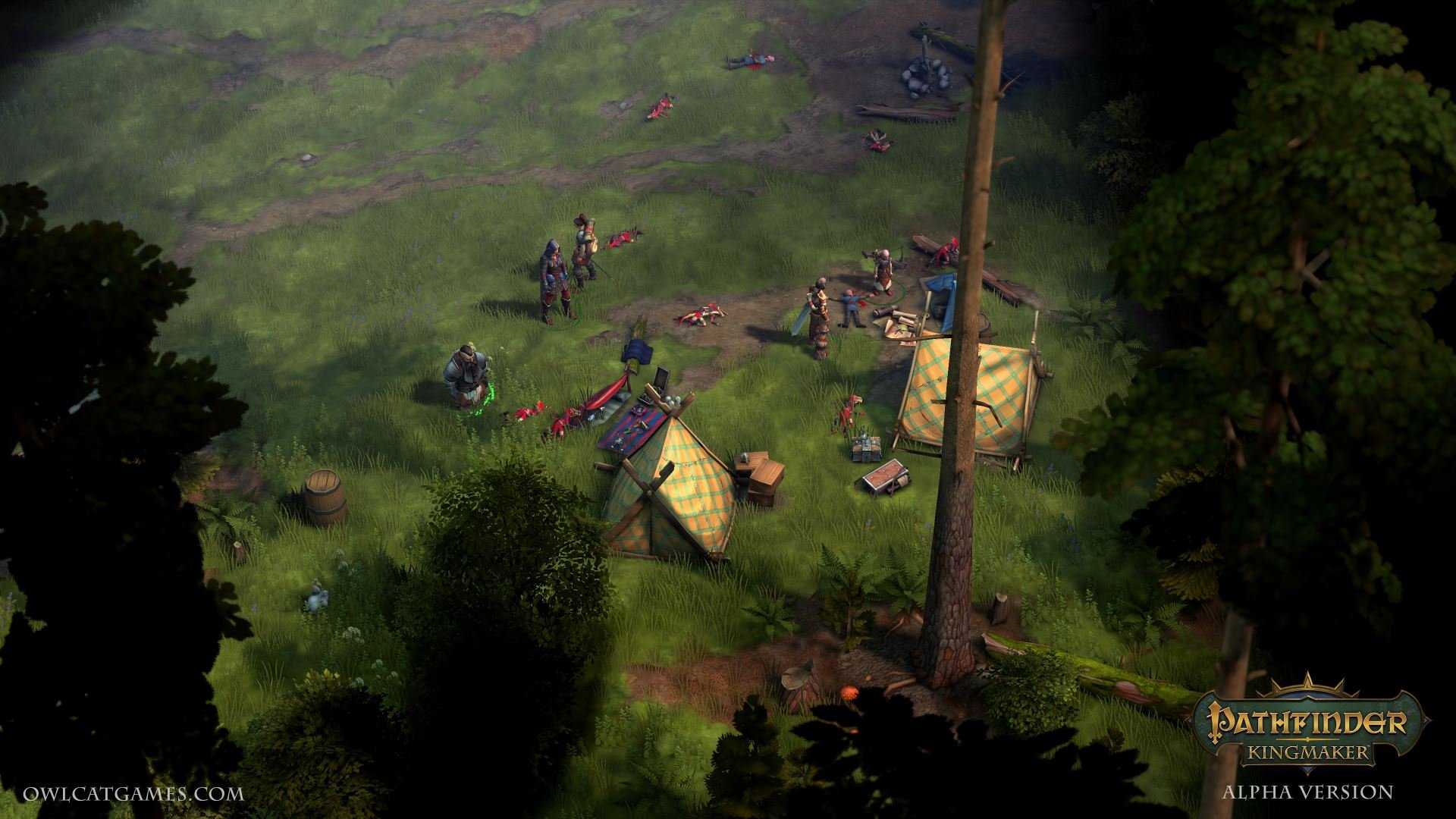
Pathfinder: Kingmaker. View full size.
I think now if you released that game you’d be lucky to put it on a phone. I don’t think people would even want it free. And that’s not to say it wasn’t a good game! It was an amazing game! But it was a product of its time back then. You could have it come out and do some additions like maybe give the guy a health bar or change up the way the enemies are and kind of ride that nostalgia wave – so there’s two things that are happening. You’re either releasing a game and saying, “remember this cool game? We’re associating with it but we’re updating it to your modern tastes”. Which some Kickstarters do, and maybe Pathfinder does it, maybe they’re saying, “we’ve got some idea of what made the old game great but we’re also going to fix a lot of the issues that would probably piss you off now”.
So, there’s that, where you update it, or you have the guys who go for a literal translation where they say, “we’re just going to make this game HD and other than that it’s going to be exactly as difficult”. I think those guys have a tougher time, because once they start developing that game they find that it’s just not fun, really, and people have a lot of options for games now. You can just go online on Steam or on the phone or whatever, and find games.
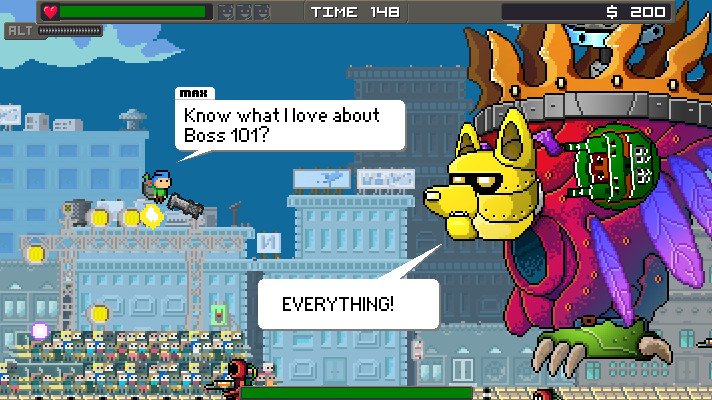
Boss 101. View full size.
What we’re doing with Boss 101, the game I’m working on now, is saying that, yeah, we remember the nostalgia, but we’re also at every turn making the game as fun as possible. In other words, we’re saying that every screen, every gameplay moment to moment you’ve got to have something fun going on. You can’t just rely on “oh it’s a hard shooter”.
So when I look at Pathfinder and Tyranny and that, there’s a little bit of the “hey we’re just remaking these old games” – and now they’re doing some new stuff, like new backgrounds, it’s 3D and so on, but it’s really relying on a lot of the trope-y stuff from the old games. I think Tyranny actually tried to advance things a little bit. I thought their systems were a little different to D&D and they tried to say, “hey, let’s do a little something here”, but now they’re back to doing Pillars 2, which is sort of like going back to D&D in that they are going to do a very traditional thing where you pick your points and attack… I don’t know… I feel like they’re selling it to the same 100,000 people every time. Like the same 100,000 people are just buying these games over and over. I’d really like to know, of all the games we just mentioned: Pillars, Pillars 2, Tyranny, Torment: Tides of Numenera, plus Wasteland 2, I would love to know… how many are owned by the same person?
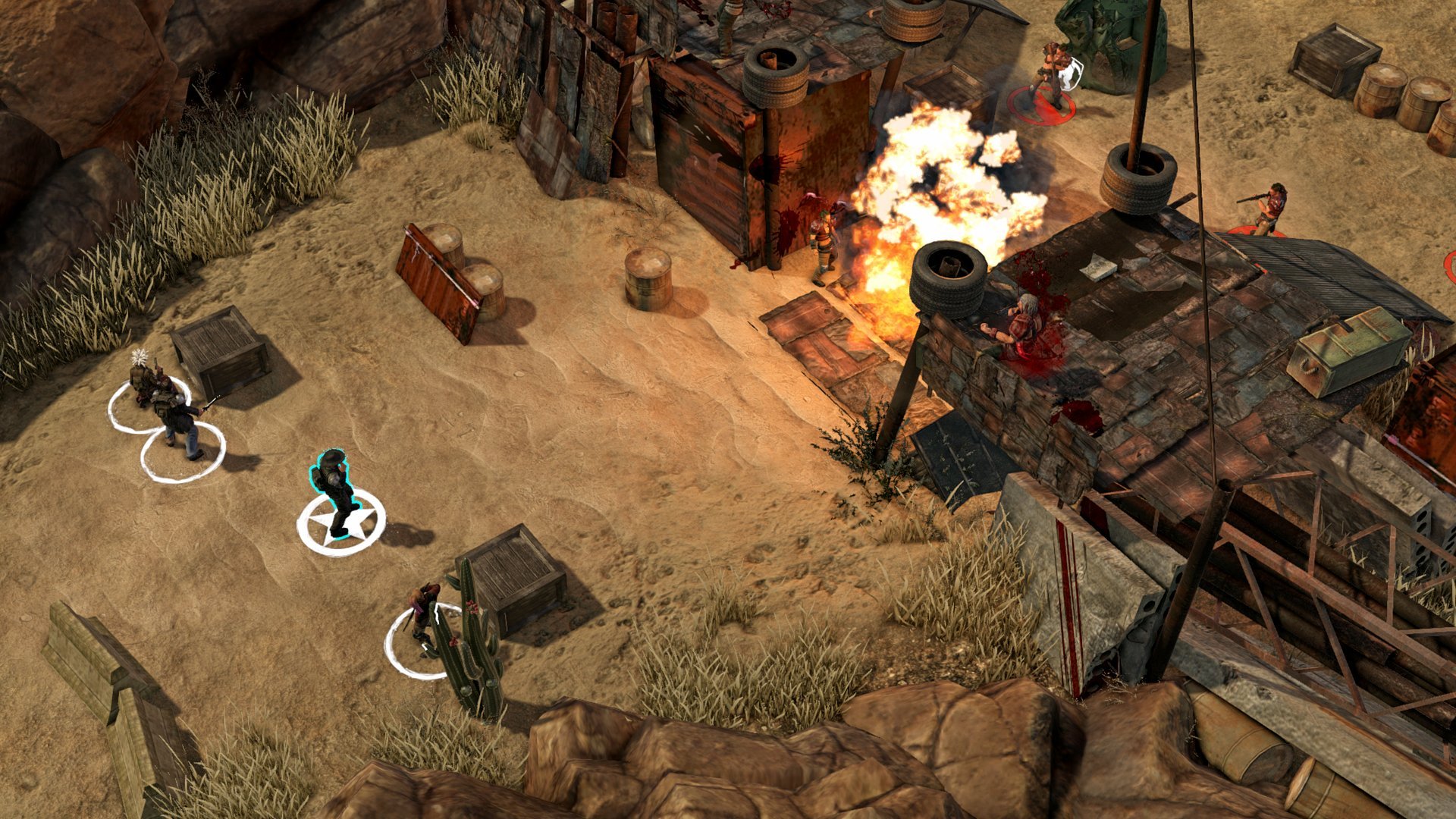
Wasteland 2. View full size.
In other words, if you took the total sales figures and then subtracted copy owners, how much would those things drop in sales? I suspect they would drop by more than 50%. I think we’re looking at a few people buying all those games – which is great! Hey man, they’re supporting the market and that’s great! There’s probably people that own all the Call of Duty games, and there’s probably people that own all the Halo games that have ever come out, and that’s what publishers rely on. They hope that’s gonna happen.
So, I do feel we’re selling it to the same group. You look at the pitches for all those games and they’re almost identical. It’s like, “remember the good old days everybody? Remember when isometric games were popular? Well we do too, and here’s this game, check this out! You got a party! You got portraits to click on! The portraits flash red when they get hit!” And you know, it’s cool, it’s awesome – those guys are jamming. The Obsidian guys, I know them and they’re awesome. Same thing with InExile. I don’t know the Pathfinder guys – I know Chris, obviously, and I’m looking at these guys and I do know the games that they’ve worked on, so yeah. It’s great – if there’s a market then definitely do it. There are reasons they’re successful!
Thanks to Tim for taking the time to share his thoughts, and be sure to read the second part here.
Donley Time Foundation is currently working on the indie title Boss 101, which Tim and I discuss at length in a forthcoming interview. You can learn more about this upcoming action adventure shoot-em-up on Steam, or follow their regularly-posted developer updates here.
Previous:
Interesting People #9: Lukasz Kukawski on working Public Relations in the games industry
Next:
Interesting People #11: Tim Donley on Kickstarter - Part 2 of 2
